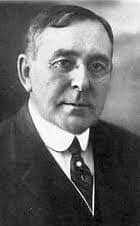Kingdom Praying — Are You Praying it With Understanding? —
With few themes of the past to hold us in attention, we turn to the second petition of the Lord’s Prayer on this day December 16. It reads, “In the second petition, which is, Thy kingdom come, we pray that Satan’s kingdom may be destroyed, and that the kingdom of grace may be advanced, ourselves and others brought into it, and kept in it, and that the kingdom of glory may be hastened.” You can immediately see that there are three phases or forms of the kingdom of Christ mentioned for us in this answer.
First, we see Christ’s kingdom of authority seen in the fact that He reigns over all, including those elements of the dominion of Satan. Our prayer in this form is that the great enemies kingdom will be destroyed.
The second phase of this kingdom is the kingdom of grace, which is Christ’s dominion in the hearts of His people. We desire by this petition that this reign of grace be advanced. It is advanced with the conversion of every elect individual as well as the progressive work of sanctification in every believer. This is where this petition has a missionary emphasis within it, as we pray at home and abroad for “ourselves and others brought into it, and kept in it.”
Then the last phrase of this petition speaks of “the kingdom of glory,” being hastened. This part of this petition deals with those who “look for the blessed hope and the appearing of glory of our great God and Savior, Christ Jesus.” (NASB – Titus 2:13) We must not make a specific date, as some have done in recent history. But, like John of old, we can pray, and must pray, that with a “holy impatience,” as one divine put it, Christ will come quickly. This is His reign of glory in eternity future.
Words to live by: Every individual falls either under the kingdom of Christ’s grace and certain glory or in the kingdom of Satan. You yourself, dear reader, are at this very day, in one kingdom or the other. There is not a third kingdom, such as the morally good kingdom, just as there is not a third place to go to once you die. It is either heaven or hell. You are either a child of God or a child of Satan. If you do not know which kingdom you are in or if you are not assured which family you are presently a member of, seek out a Bible-believing pastor and discuss it with him today. It is that important, indeed, eternity and where you spend it is at stake.
Through the Scriptures: 1 Peter 3 – 5
Through the Standards: Our deaths are ordained by God
WLC 84 — “Shall all men die?
A. Death being threatened as the wages of sin, it is appointed unto all men once to die; for that all have sinned.”




